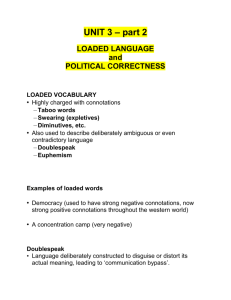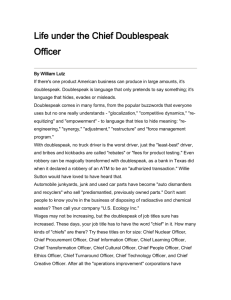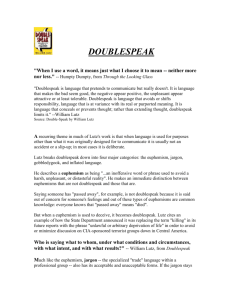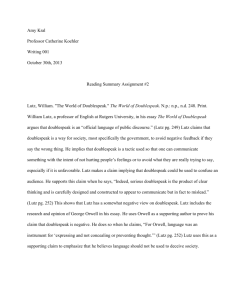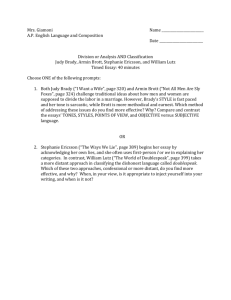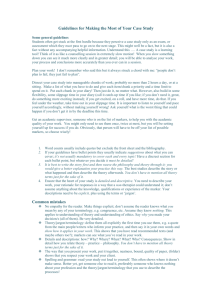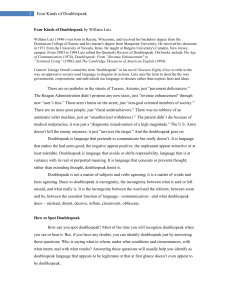Communication or Cover-up: Working with Jargon
advertisement
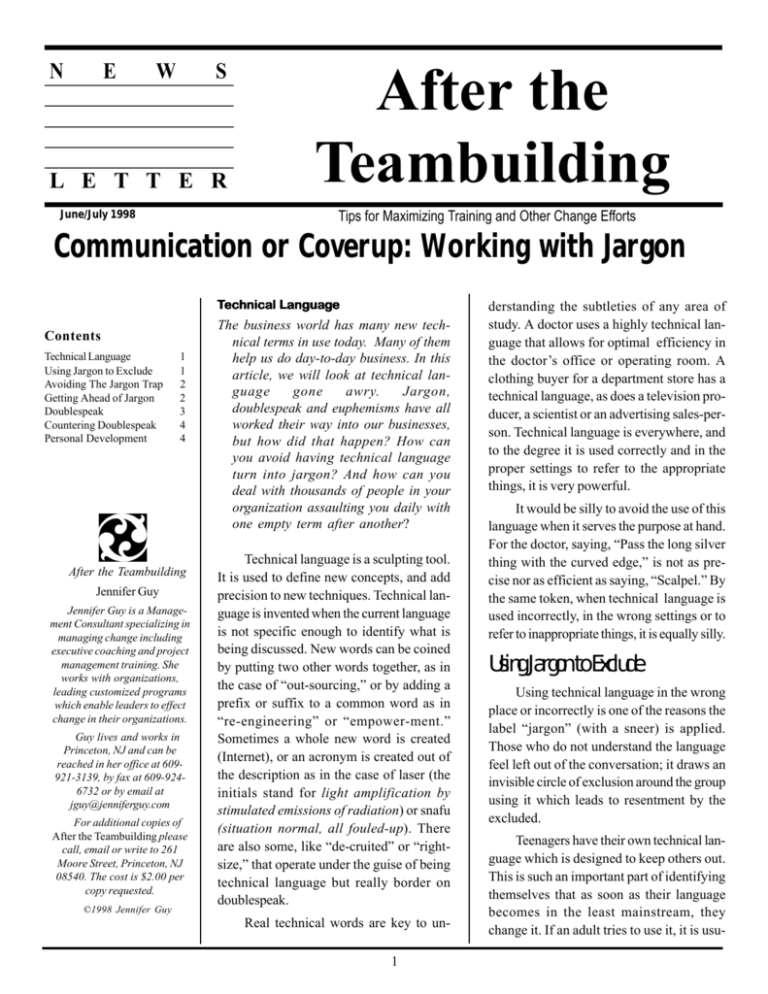
N E W S L E T T E R After the Teambuilding Tips for Maximizing Training and Other Change Efforts June/July 1998 Communication or Coverup: Working with Jargon Tec hnical Langua ge echnical Languag Contents Technical Language Using Jargon to Exclude Avoiding The Jargon Trap Getting Ahead of Jargon Doublespeak Countering Doublespeak Personal Development 1 1 2 2 3 4 4 After the Teambuilding Jennifer Guy Jennifer Guy is a Management Consultant specializing in managing change including executive coaching and project management training. She works with organizations, leading customized programs which enable leaders to effect change in their organizations. Guy lives and works in Princeton, NJ and can be reached in her office at 609921-3139, by fax at 609-9246732 or by email at jguy@jenniferguy.com For additional copies of After the Teambuilding please call, email or write to 261 Moore Street, Princeton, NJ 08540. The cost is $2.00 per copy requested. ©1998 Jennifer Guy The business world has many new technical terms in use today. Many of them help us do day-to-day business. In this article, we will look at technical language gone awry. Jargon, doublespeak and euphemisms have all worked their way into our businesses, but how did that happen? How can you avoid having technical language turn into jargon? And how can you deal with thousands of people in your organization assaulting you daily with one empty term after another? Technical language is a sculpting tool. It is used to define new concepts, and add precision to new techniques. Technical language is invented when the current language is not specific enough to identify what is being discussed. New words can be coined by putting two other words together, as in the case of “out-sourcing,” or by adding a prefix or suffix to a common word as in “re-engineering” or “empower-ment.” Sometimes a whole new word is created (Internet), or an acronym is created out of the description as in the case of laser (the initials stand for light amplification by stimulated emissions of radiation) or snafu (situation normal, all fouled-up). There are also some, like “de-cruited” or “rightsize,” that operate under the guise of being technical language but really border on doublespeak. Real technical words are key to un1 derstanding the subtleties of any area of study. A doctor uses a highly technical language that allows for optimal efficiency in the doctor’s office or operating room. A clothing buyer for a department store has a technical language, as does a television producer, a scientist or an advertising sales-person. Technical language is everywhere, and to the degree it is used correctly and in the proper settings to refer to the appropriate things, it is very powerful. It would be silly to avoid the use of this language when it serves the purpose at hand. For the doctor, saying, “Pass the long silver thing with the curved edge,” is not as precise nor as efficient as saying, “Scalpel.” By the same token, when technical language is used incorrectly, in the wrong settings or to refer to inappropriate things, it is equally silly. Using Jargon to Exclude Using technical language in the wrong place or incorrectly is one of the reasons the label “jargon” (with a sneer) is applied. Those who do not understand the language feel left out of the conversation; it draws an invisible circle of exclusion around the group using it which leads to resentment by the excluded. Teenagers have their own technical language which is designed to keep others out. This is such an important part of identifying themselves that as soon as their language becomes in the least mainstream, they change it. If an adult tries to use it, it is usu- July/August 1998 ally either inappropriate, wrong or misapplied, but in any case, teenagers laugh at it. In the corporate arena there is just as much technical language as in the scientific, medical or social arenas, and there is just as much technical-language-turned-jargon as well. We’ve all observed someone string together a series of jargon terms that didn’t mean anything to their bewildered listener. We have all heard conversations that consist of technical language when regular language would do just as well. And we have all seen the group meeting that turns into a private meeting between two people, battling for supremacy using jargon as their weapon. Avoiding The Jargon Trap If technical language is to be valid, it must be used at the right time, in the right setting, about the right issue. Since most everyone has experience with technical language that originates in culture change or team-building workshops, let’s look closely at how technical language should be introduced and worked with in this environment. During the workshop, the facilitators will introduce the new words as they are needed. There are four important steps that must be followed regarding these new terms. •The word must be clearly defined. The definition should be clear, concise and not self-referential. It also should be related closely to a new principle being introduced. Too many workshop leaders (especially those trained by consultants to lead a proprietary workshop inside a client company) do not grasp the language well enough to teach it. We all know that understanding a concept and being able to teach it are two very different things; to teach it, the level of understanding must be top-notch. Self-referential definitions are indicators of a fa- cilitator with a relatively weak grasp of the language. •The word must be sufficiently distinguished from other words that are close to its meaning. Why use term x as opposed to term y? Participants must be enticed by the subtlety of the new term; it must Are you having trouble with your change effort, your manager, your staff? You can have ½ hour of free coaching on your issues. Call 609-921-3139 provide a useful niche in their environment. Much too often new terms are used to mean the same thing as old ones and their meanings get collapsed. If there are people who leave a workshop without fully understanding the concept behind a particular term, they will go on to use that term incorrectly and tarnish its intent. A client of mine once said, “Before the workshop we had problems. Then we learned the word ‘breakdowns’ and learned how different breakdowns are from problems. Even so, now you never hear that anyone has a ‘problem’ anymore. Everything is a ‘breakdown,’ whether it fits the definition or not.” The facilitator in this case didn’t distinguish between “problem” and “breakdown” well enough, so the two words ended up meaning the same thing, thereby rendering “breakdown” an impotent and extraneous jargon term. •The word must be used frequently. Introducing a term and not referring to it again will not give people even a basic facility with the new expression, let alone give them access to the subtleties of the principle it de2 notes. We all know how to get to Carnegie Hall, right? Practice, practice, practice. It is the same in using a technical language. The more one uses it, the more one can use it correctly. And correct usage is key to appreciating and using the principle associated with the term. •The word must ALWAYS be used correctly in the workshop.. Extreme rigor is very important. Take the time to use a term correctly every time you use it. The facilitator should correct people and spend some time distinguishing difficult terms from other terms with similar meanings. If people don’t understand something, it should be redefined. Too often, the workshop leaders don’t want to upset people by appearing too picky or zealous about the terminology. These rules may seem simple, but they are often not applied. If any one of these pieces is missing, it is highly likely that the terms presented in the workshop will be used incorrectly and collapsed with exactly the things they were intended to be distinguished Try before you buy. Do you need coaching on how to coach or other business issues? Call 609-921-3139 for 1/2 hour of free personalized coaching. from. No matter how useful the terms seem in the workshop or seminar, they are merely tiring when thoughtlessly bandied about without their original meaning behind them. Lack of rigor in using technical language can undermine the most impressive of change efforts. July/August 1998 Getting Ahead of Jargon “Great,” you say, “I’ll pass this along to the facilitators. But we already have the problem and we want to fix it. What do we do now?” There is no overnight solution, but there are steps you can take to affect this situation over time. “Rudeness is the weak person’s imitation of strength.” Eric Hoffer, The Passionate State of Mind, 1954 Just because some people misuse the terminology is no reason to ignore the concept altogether if it is a concept you find useful. Make sure when you use the term, that you are using it in the way it was intended. Assume that if others are bandying it about, so are you. This may or may not be true, but it is an easy habit to pick up and a hard one to see in yourself. Use others as a mirror in the event this is true in your case. Others don’t see it in themselves, either. Clarify for yourself. Ask others what they mean when they use a term and you suspect it is not being used as intended. (There is no need to be smug; it is probably a habit they have and they might even appreciate your bringing it to light.) Those who are suspicious of the intent of the workshop, or perhaps suspicious of the motives or authenticity of management, can easily discredit the workshop by discounting the language. An example of this would be the term “Blue Chip Activity” to refer to the top 20% of activities (in the 80/20 rule). Those seeking to invalidate the workshop could now call them “Blue Corn Chips” and embarrass someone who is using the term correctly. This embarrassment could lead to being careful about who is around when the term is used, and eventually, not using it at all. If this happens to you, here are a few suggestions to deal with it. Avoid using the term altogether, but use the principle. It isn’t the terminology that is important after all it’s the principle. Terminology is just away of referring to the principle. Refer to that top 20% as the most “high leverage” or the “low hanging fruit” or “the top 20%,” depending on the context. Exaggerate the term. Use the term “Blue Corn Chips” with a wry smile, and define it as “that 80/20 principle from the workshop.” In other words, go with the flow. If you wanted to have a little fun with this, you could take it one step further. Call it the “Frito’s” (my favorite corn chip). Pushing the envelope this way diffuses embarrassment and gets the point across. Add an acknowledgment of those who would embarrass you when you use the term. For example, “I know some people don’t like this term, but this is one of my ‘Blue Chip’ activities.” This lets people know where you stand and allows others to have their opinion without it’s affecting your use of the terms that suit you. None of these suggestions are better than the other — you should just do what is comfortable for you. You can be sure that those who would embarrass you are not intending to embarrass you, but are just unwilling to buy into the principles (by way of the terminology) because of their nature or their suspicions. This is their way of expressing it, but that needn’t keep you from benefitting from and participating in any workshops or training the company provides. Too often, people think they are expected to agree with everything in a workshop or that if they don’t buy into one piece, the entire workshop is invalid. My advice? Use everything that works for you, leave what doesn’t, and let others do the same. 3 Doublespeak Doublespeak is a very specific type of jargon which intentionally obscures meaning. “Negative patient outcome” is one of the most famous examples of doublespeak, as it was intended from the start to obscure what the speaker meant: “He’s dead.” (Can you imagine Dr. McCoy of Star Trek® fame saying to Captain Kirk, “We have a negative patient outcome, Jim.”?) In politics we hear of “revenue enhancement” and “wage-based premiums,” doublespeak for “taxes.” In business, “force reduction,” “position elimination” and “selective separation,” are euphemisms for being out of a job. William Lutz, in his book “The New Doublespeak”1 tells a tale of “negative gain in test scores” (lower test scores), “substantive negative outcomes” (death) and “fictitious disorder syndrome” (lying). Lutz goes into the history of doublespeak and provides the reader with a dizzying array of examples. Rawson’s Dictionary of Euphemisms and Other Doubletalk2 discusses some terms that were doublespeak when they were coined (saloon, cemetery, mortician) but have come to be mean exactly what they were intended to hide. In business, the phrase organizational change is now tainted after years of use. Gary Hamel, in his most recent Harvard Business Review article, says that the word change is often “simply a code word for something nasty: a wrenching restructuring or reorganization.”3 “I have an opportunity for you,” can mean “you have to work late,” and empowerment may signal that there is more for you to do. What are the consequences of double-speak, other than the obvious rolling of eyes? Doublespeak is difficult to deal with because the user’s intention is either to cover up something that is em- July/August 1998 barrassing to discuss, or to fool you into thinking things aren’t as bad as they seem. People have discovered that they can fool the Devil; but they can’t fool the neighbors. Edgar Watson Howe, Ventures in Common Sense (1919) The credibility of the user is seriously diminished when doublespeak is used to justify an action that will cause people anguish. Everyone should be very careful with this because credibility is hard-won and easily lost. Credibility and employee loyalty do not naturally return after the unpleasant event is over. In these times of labor surplus and the stock market’s endorsement of downsizing, each employee is wondering if they’re next. If you want a loyal staff, even with these threats over their heads, then be straight. Say what you mean without euphemisms and don’t insult their intelligence. They will respect you for it. Countering Doublespeak When people use doublespeak on you, what should you do? You know they are misrepresenting the issue, but it isn’t as if you can call them a liar. All you can really do is ask questions. For example: What does this mean? How many people will lose their jobs? How many departments will be affected? Are you really talking about “X”? Is he really dead, Jim? The more questions you can ask about the issue at hand and the more details you press for, the more the doublespeak will fall away from the issue and the straight information will come out. (Remember how your parents would question you when you were trying to cover something up. They knew what was going on.) It is important that you ask questions without ire or indignation. It is important that curiosity and concern be at the source of your questions, which is easier when you have compassion for the messenger. No one likes to deliver bad news. No one likes to see departments decimated by downsizing or re-structuring. It is as upsetting for the messenger as it is for everyone else, even if they do cover it up with a detached or unfeeling demeanor. Also, it won’t get you any more information to grill the messenger (or originator) in an indignant fashion — all it will yield is more people, more upset. Technical language is very powerful. But no matter how valuable or useful or clever or significant these words are, if they are a sham or a cover-up for real communication, then they can upset people, undermine the company, reduce morale and erode the effectiveness of everyone. The best way of dealing with doublespeak is to be rigorous with yourself and give others the benefit of the doubt without being lax. Talk to them (don’t preach) as the human beings they are. Speak to them the way you would like to be spoken to, without jargon, without doublespeak and without indignation — not because it is the right thing to do, but because that is what works. They are only, as are we all, doing the best they can. 4 Personal Development What About Practice? In the previous article I talked about practice with regard to using new terms in workshops. Musicians, artists and team sports players all know the value of practice. They know you can’t always be performing—that you must spend time honing your craft and that the more time you spend in effective practice, the better your performance is. When I was leading workshops on project design every day for 6 months straight, I found I had a tendency to forget the value of practice—and when I did, my “performance” got stale. When, at the end of each day’s workshop, I practiced the next day’s workshop I found my work was smoother, more refined, more thoughtful, more effective! I would practice saying things with a different emphasis or different words or perhaps in a different order. Where could practice help you? Should you practice part of that meeting outline? That presentation? Perhaps if you practiced what you are going to say, that performance review wouldn’t be quite so difficult. Practice is a time-tested and underutilized method of operating. Its benefits are at times difficult to quantify, but the time spent is always worthwhile. 1 Lutz, William, “The New Doublespeak,” Harper Collins, New York, 1996 2 Rawson, Hugh, “Dictionary of Euphemisms and Other Doubletalk,” Crown, 1995 3 Hamel, Gary, “Strategy as Revolution,” Harvard Business Review, Jul.-Aug. 1996, pp. 69-82.
